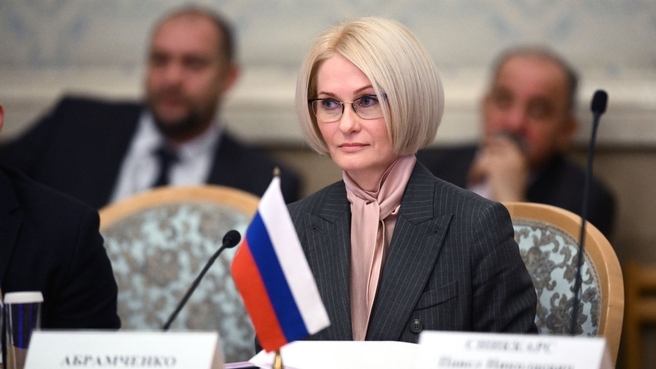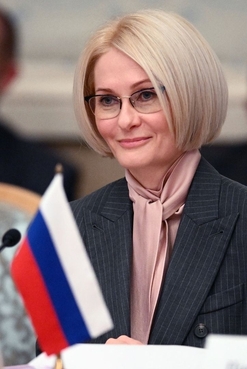Moscow hosted the 24th meeting of the Russian-Mongolian Intergovernmental Commission on Trade, Economic, Scientific and Technological Cooperation.
Viktoria Abramchenko at the 24th meeting of the Russian-Mongolian Intergovernmental Commission on Trade, Economic, Scientific and Technological Cooperation
The Russian delegation at the talks was led by Deputy Prime Minister Viktoria Abramchenko, head of the Russian section of the commission. The Mongolian delegation was chaired by Deputy Prime Minister and Minister of the Economy and Development of Mongolia Chimed Khurelbaatar.
Viktoria Abramchenko stressed that bilateral relations between Russia and Mongolia are based on a long history of friendship, cooperation and mutual assistance. She noted the two countries’ similar approaches to many topical issues, mutually respectful dialogue and equitable interaction of the parties in international affairs.
The Deputy Prime Minister noted the growing trade between the two countries, which increased by more than 30 percent last year.
“We expect that it will reach a historic high of $2 billion by the end of the year. At the same time, we understand that 98 percent of mutual trade consists of Russian products supplied to Mongolia, and for our part, we emphasise that we want to see Mongolian goods on our market,” Viktoria Abramchenko said.
The Deputy Prime Minister highlighted a number of successful projects, including cooperation in the energy sector. Russia, in particular, increased its electricity supplies to Mongolia to 100 MW.
Viktoria Abramchenko also talked about promoting another important project, the construction of a Trans-Mongolian gas pipeline to carry 50 billion cubic metres of gas from Russia to China. “By now, the feasibility study has been approved for this project and the field survey and exploration have been completed, so we are working on this, and we have already moved to the design phase,” Ms Abramchenko said.
Another issue that prompted some discussion among the commission members and which is of interest to, among others, the Mongolian side, is increasing oil product exports from Russia to Mongolia, which has already increased by 60 percent over the previous period. “We have received an additional request from Mongolia to increase the supply of diesel fuel,” said Ms Abramchenko, who chairs the Russian chapter of the commission. “We are now discussing this issue in detail and plan to take the relevant decision in December.”
The deputy prime minister noted the efforts to promote cooperation on the Central Railway Corridor, an infrastructure project to link Russia, Mongolia and China. At 1,700 kilometres long, it provides, among other things, for upgrading the Ulaanbaatar Railway joint venture. “By the end of 2023, the feasibility study for this project will be completed and the practical work to carry out the project will begin,” Viktoria Abramchenko said.
Since the Covid-19 restrictions have been lifted, Ms Abramchenko suggested returning to the discussion of resuming direct flights between Moscow and Ulaanbaatar, because currently only regional flights between Ulaanbaatar, and Ulan-Ude and Irkutsk are available. “Before the pandemic, there were six flights a week from Moscow to Ulaanbaatar, and we very much want to resume direct flights to the capital of Mongolia,” Ms Abramchenko said. “Our colleagues know about this request and we agreed to continue our consultations on this issue.”
The two countries also continue to cooperate in education. According to Viktoria Abramchenko, the Russian side is committed to teaching Russian to Mongolian schoolchildren. The commission members agreed that one of Ulaanbaatar’s best schools – school No. 3 – will retain its format as a Russian-Mongolian school.
Cooperation between the two countries also embraces the technological sectors, like space industry. In August 2022, the Roscosmos State Corporation and the Mongolian Ministry of Digital Development and Communications signed a Memorandum of Understanding in the field of space research and exploration for peaceful purposes. “We agreed to ensure that Russian specialists train Mongolia’s first female cosmonaut,” said Ms Abramchenko. “I believe this to be a great and symbolic project, and it will be a follow-up to the flight made jointly by Vladimir Dzhanibekov and Mongolian cosmonaut Jugderdemidiin Gurragchaa.”
The two parties outlined a plan for future activities to strengthen their trade and economic links, and cooperation in energy, railway transport, environmental protection, agriculture and industrial production. The meeting participants exchanged opinions on humanitarian cooperation and diversification of trade links.














